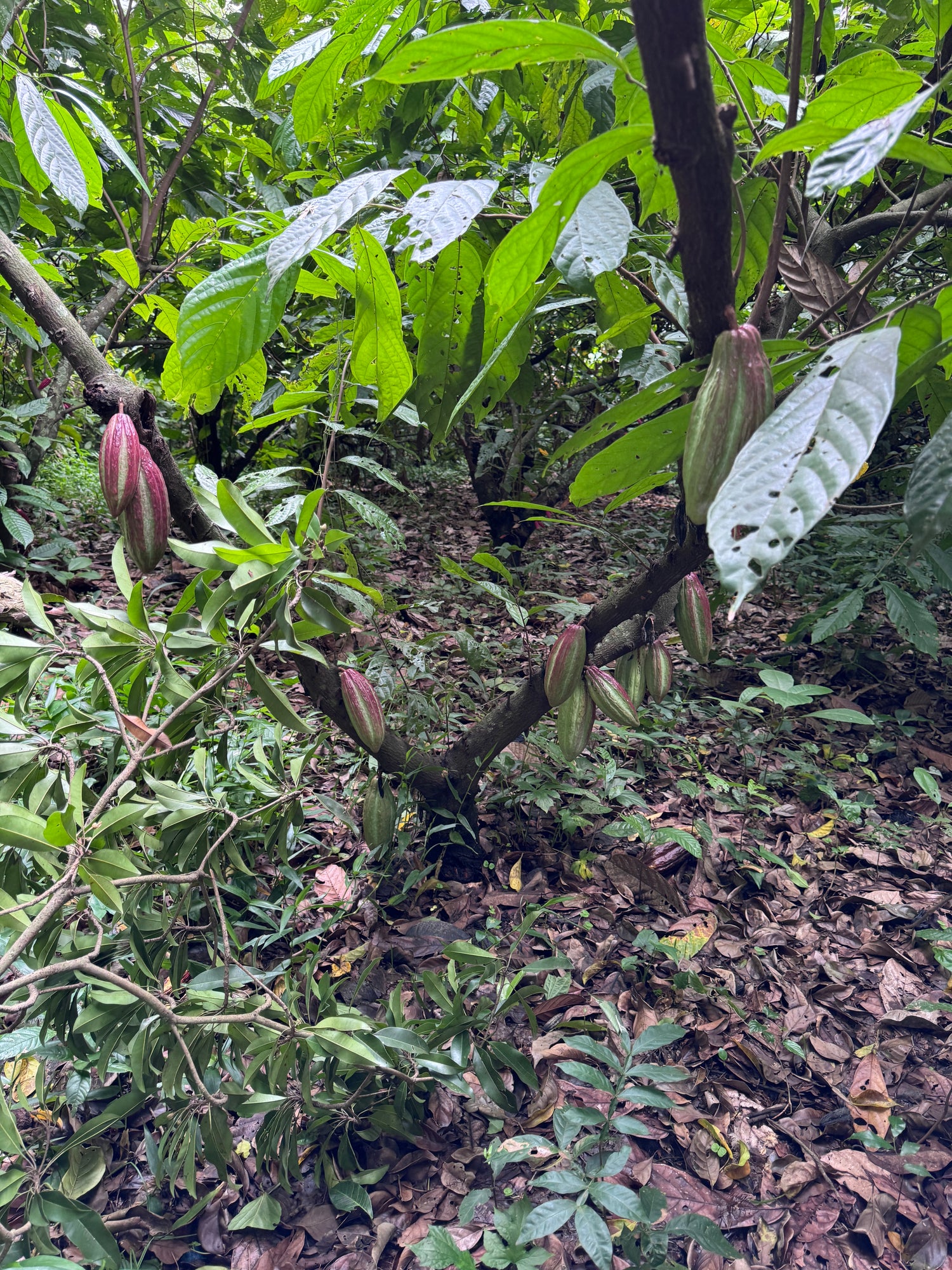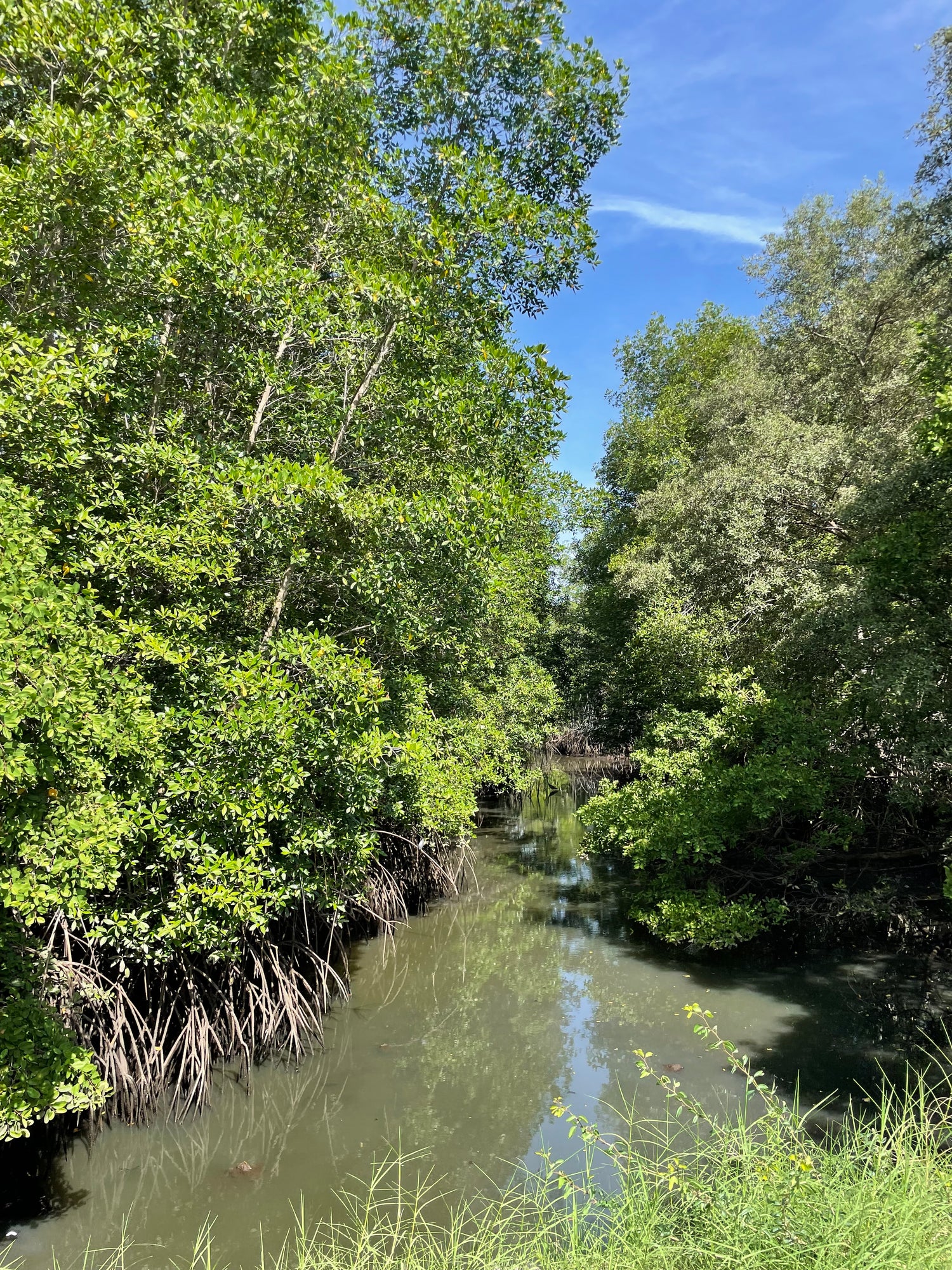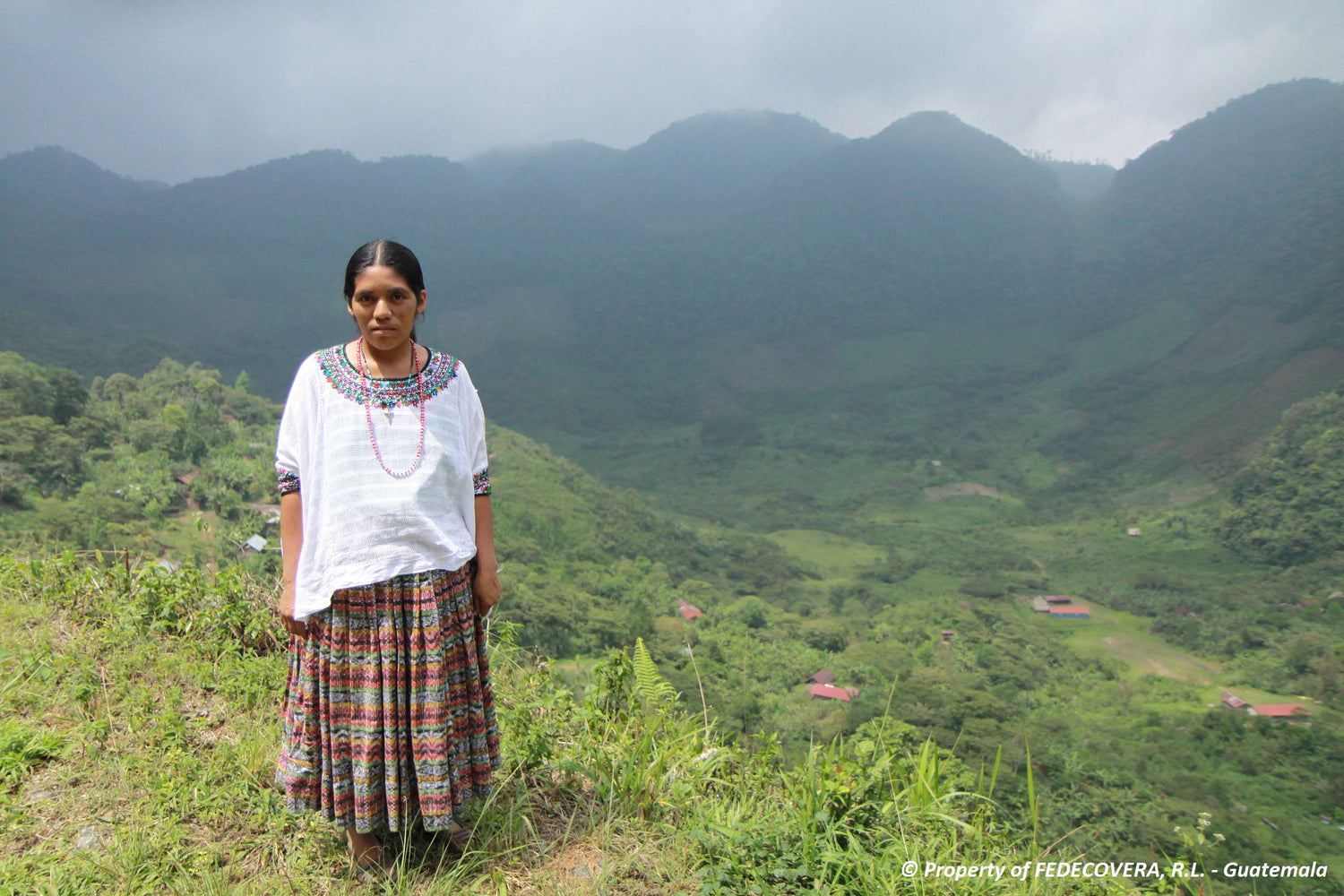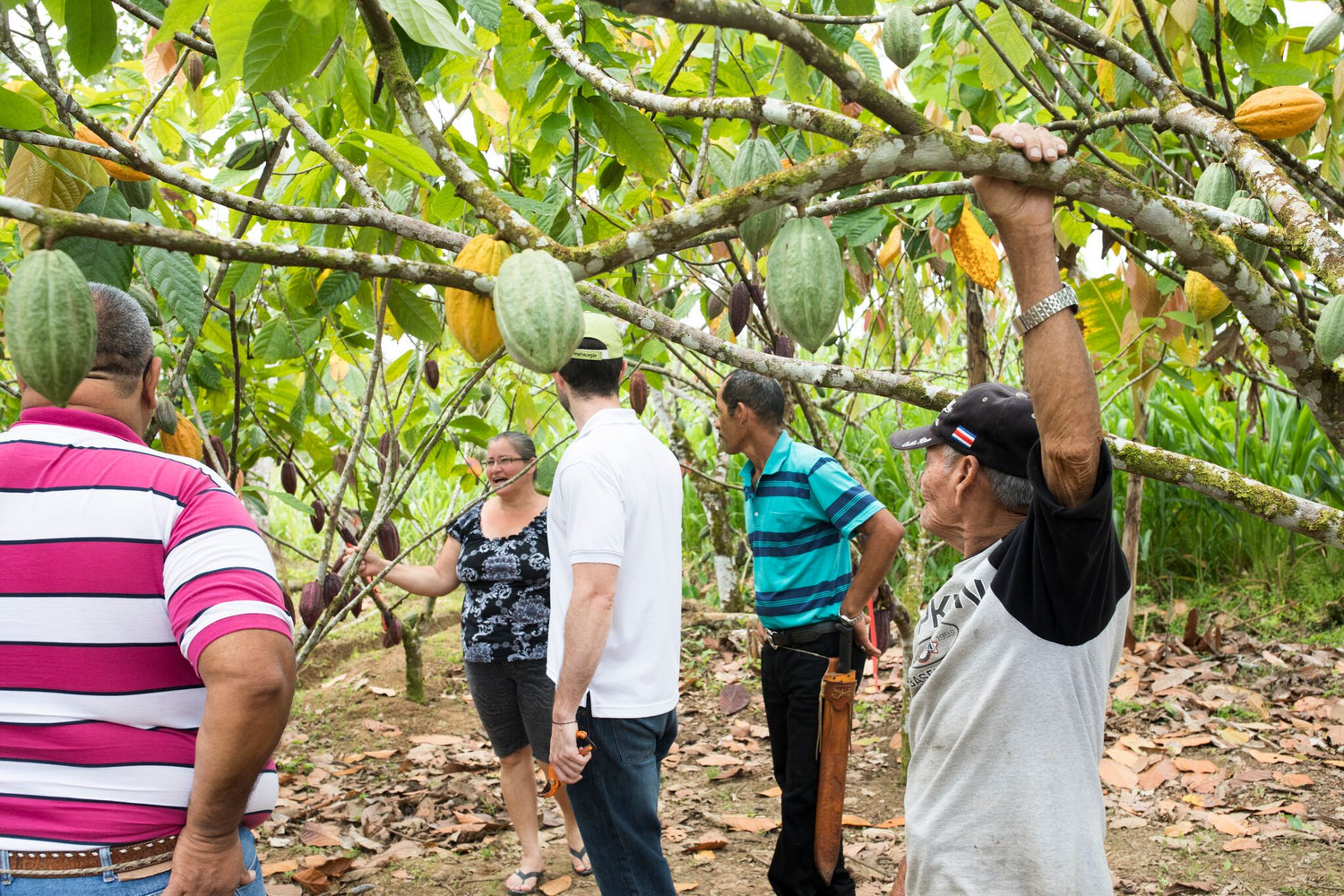Il cacao sostenibile, cresce in sistemi agroforestali rigenerativi

EL SALVADOR
FINCA CUYANCÚA - Our Family's Farm
Single Estate Farm
Our farm is located in Atecozol, Izalco, a municipality of Sonsonate at 1,312 feet (400 meters) above sea level. We are near many waterways, and a small stream crosses the farm and fills up the reservoir that we use for irrigation.
In the early 2000’s JuanRa’s dad, Rafael, started to enhance the ancient cacaotal while also creating a cooperative of fine flavor cacao producers ES-CACAO. He took the initiative to develop a cacao nursery, and to transform the old coffee mill into a modern post-harvest facility where cacao from all the growers in the cooperative is fermented and dried to bring out the best quality the beans can offer. Over the years, we’ve held many seminars on proper agricultural practices at different stages of cacao growing, from planting and grafting to pruning and harvesting.
Apart from the fact that we helped plant some of the trees that produce these cosmically delicious beans, we are very attached to this farm because of all the wonderful learning experiences we’ve had here. This was where our initial encounter took place with the magical plant of theobroma cacao, and where JuanRa formed precious family memories of going to the farm during the weekend with his grandparents and father ever since he was very little. Fine flavor trinitario acriollado and DNA test-confirmed criollo cacao trees now grow underneath the tropical rainforest canopy, in community with other plants such as mango, banana, star apple, avocados, oranges, tropical flowers, vanilla, and cinnamon.
Another interesting fact is that the region where the farm is located used to be an indigenous settlement thousands of years ago. While walking or working on the land, you can easily find carved obsidian objects and small pieces of pottery scattered around, left by the people who called this home before we did.
Sensory analysis of the cacao
Aroma: Rum, slightly sweet, with notes of chocolate and caramel.
Flavor: Intense, dark, earthy flavors initially, with upfront bitterness. The flavor notes develop into green and floral notes reminiscent of orange blossom and jasmine.

EL SALVADOR
ATEHUÁN Finca S.Fernando
Single Estate Farm - Finca San Fernando, Ateos, El Salvador
Fine Flavor Cacao cultivation on the San Fernando farm started just several years ago, thanks to advocacy from VAICACAO co-founder JuanRa. When JuanRa outlined to one of the farm owners the environmental and economic advantages of planting cacao trees, as compared to other crops, the farm owner was inspired to join the local cacao cooperative and to begin growing fine flavor trinitario acriollado cacao. He quickly developed the farm into one of the steadiest cacao producers in El Salvador. A team of five people work on the cacao farm, using modern and technologically advanced methods.
The San Fernando farm sits at 2,198 feet (670 meters) above sea level, on the outskirts of the gently sweeping mountain range Cordillera del Balsamo, located in Ateos, municipality of Sacacoyo, in the La Libertad department. The cacao trees here grow among fragrant mahogany and cedar trees, plus a local white cedar called volador. We are proud to be the first to export this cacao from El Salvador and to offer it to the world through our Atehuàn, chocolate bars and holistic ceremonial cacao, which we named after the historical pre-Columbian name of this beautiful region.
Sensory analysis of the cacao
Aroma: Soft notes of sweet vanilla fudge, cream, and toffee.
Flavor: Starts off quite dark in flavor, then gives a strong sweetness. Some brown fruit flavors, with very subtle stone fruit flavors. Bitter finish.
Traceability: We source this cacao directly from the farm, working independently to build strong relationships with growers. This approach allows us to ensure full transparency and traceability, from the soil where the cacao is cultivated to the final product. By partnering with farmers who value sustainability and ethical practices, we bring you cacao of exceptional quality with a story worth sharing.

EL SALVADOR
LENCA, Hacienda La Carrera
Single farm in the Biosphere close to the Jiquilisco Bay, El Salvador
Tropical fruit paradise: The Hacienda San Jose del Real de La Carrera is one of the oldest and biggest cacao farms in El Salvador. This farm sits beside the mangroves of Jiquilisco Bay, in the department of Usulutan, on the southeast Pacific coast of El Salvador, a region known for its rich and fertile soil. The cacao trees here were initially planted more than half a century ago, and were at one point left unattended due to civil war and government-imposed land reform. Today, younger generations have done tremendous work to rescue these previously abandoned cacao lands. A natural hybridization of many special trinitario acriollado cacao strains has developed into a unique hybrid found only on this estate. Skilled farm workers complete the post-harvest process onsite by carefully fermenting and drying the cacao.
To give you additional visuals of the beautiful blue and green landscape: the area where the cacao is planted, at 82 feet (25 meters) above sea level, is surrounded by mango trees. Farther away on the estate, coconut trees border the mangroves,and still farther away on the same property you’ll find plantains and sugar cane. We named this chocolate bar after the Lenca, a Mesoamerican indigenous people who enjoyed a thriving culture for centuries and likely millennia before Spanish invasion, who had frequent contact with Maya and other groups, and who endure and flourish to this day.
Sensory analysis of the cacao
Aroma: fruit cake, fruity, nutty.
Flavor: chocolatey, fruity, floral. A variety of different fruit flavors. It develops into richer banana and dried fruit flavors with an earthy backbone, and ends on green banana notes. The aftertaste is clean with lingering chocolate and banana notes.
Traceability: We source this cacao directly from the farm, working independently to build strong relationships with growers. This approach allows us to ensure full transparency and traceability, from the soil where the cacao is cultivated to the final product. By partnering with farmers who value sustainability and ethical practices, we bring you cacao of exceptional quality with a story worth sharing.

GUATEMALA
Q'EQCHI'
Micro-region - Cacao from Cobán, Alta Verapáz (Cooperatives System)
Rainforest collaboration: The magical cacao beans in our Q’Eqchí chocolate bar and Artisanal Ceremonial cacao come from deep in the rainforest in Guatemala, from FEDECOVERA - the Federation of Cooperatives of Cobán, Alta and Baja Verapáz - an association of 40 cooperatives made up by approximately 31,000 Qʼeqchiʼ and Pocomchi farmers. The federation is one of Guatemala’s leading reforestation organizations, and they are recognized worldwide for their production of organic cardamom. They have been leading by example since 1976, fulfilling their mission to provide a way for farmers to improve their living conditions while honoring and protecting their culture and ecosystem.
Farming families produce and export diversified crops which range from cacao to coffee, cardamom, pepper, and turmeric, across the Mayan rainforest canopy of northern Guatemala. Their delicious cacaos are certified organic and consist of a blend of criollo and trinitario strains.
Sensory analysis of the cacao
Aroma: Ripe cherries, cocoa, cardamom, cream
Traceability:We rely on cacao specialists like Daarnhouwer, who work directly at the farm-gate to source this cacao origin. Their expertise ensures that every purchase is conducted ethically and transparently, guaranteeing both traceability and exceptional quality. By collaborating with trusted partners, we uphold our commitment to sustainability and integrity, even in cases where we cannot be physically present at the farms..

EL SALVADOR
FINCA PARRAS LEMPA
Single Estate Farm
River valley beauty: The cacao in our Tlaloc chocolate bars, and holistic ceremonial cacao comes from a single estate, and we invite you to travel there with us virtually, to imagine the tropical landscape as you taste this terroir! The farm is located in El Salvador’s lush Lempa River valley, in the municipality of San Vicente, at 131 feet (40 meters) above sea level. A smaller river called the Acahuapa flows through the farmland, watering its crops of cacao, coconuts, and plantains. We love the fine flavor cacao that grows in this fertile land crisscrossed with life-giving water, so we named the chocolate bar Tlaloc, after the god of water celebrated by the Aztec and Maya civilizations.
A team of seven plus a supervisor handle the daily tasks on the farm. After harvesting their cacao, a hybrid of trinitario acriollado varieties, they ferment and dry the cacao onsite to ensure the utmost quality. Benedicto, whose family owns the estate, is one of several co-founders of a local cooperative of cacao producers, where we are also members and with whom we have worked since the beginning of our cacao and chocolate projects. It is a pleasure to have witnessed their hard work firsthand throughout the years, and an honor to be the first to bring our dear friend Benedicto’s specialty cacao outside of El Salvador and to share it with the rest of the world!
Sensory analysis of the cacao
Aroma: Very mild, with notes of subtle milk chocolate, sweet caramel, and dates.
Flavor: Initial rich chocolate kick that develops into more earthy flavors with subtle green notes. Finishes with pronounced nutty flavors and a nutty and chocolatey aftertaste.
Traceability: We source this cacao directly from the farm, working independently to build strong relationships with growers. This approach allows us to ensure full transparency and traceability, from the soil where the cacao is cultivated to the final product. By partnering with farmers who value sustainability and ethical practices, we bring you cacao of exceptional quality with a story worth sharing.

COSTA RICA
NAHUA
Scrumptious social impact: Nahua is Costa Rica’s leading fine flavor single origin cacao provider, with a strong social mission of improving farmer livelihoods and conserving the environment. The organization is B-Corp certified and works directly with local farming families to grow some of the best trinitario hybrid cacaos available. We rely on their diligent work in handling the crucial post-harvest processes, which ensure the very best outcome for these flavorful beans. Nahua is made up of a network of 430 smallholder cacao farming families, in an area of 800 acres across Guatuso and Upala in the northern part of the country, between the Caño Negro Wildlife Reserve and the Cordillera de Guanacaste mountain range. This area is named for the region’s original inhabitants, an indigenous tribe known as the Maleku, who still reside in the area.
Nahua founder Juan Pablo has been an active pioneer and mentor not only locally in Costa Rica, but also throughout Central America’s cacao farming community, by sharing his experience at regional seminars and through ongoing friendly advice. We have expanded our knowledge of agricultural practices thanks to him, and have also benefited from his excellent example of how to create added value to the cacao crops by transforming the magical fruits of the cacao trees into top quality sustainable products. Power to the people!
We source this cacao throughtout our partner, Daarnhowuer.
Sensory analysis of the cacao
Aroma & Flavor: Nahua’s cacao bean flavor profile is very balanced, characterized by strong cacao notes, yellow fruits, and warm and full cherry flavors, combined with a subtle hint of grapefruit and full-bodied caramel notes.
Traceability:We rely on cacao specialists like Crafting Markets, who work directly at the farm-gate to source this cacao origin. Their expertise ensures that every purchase is conducted ethically and transparently, guaranteeing both traceability and exceptional quality. By collaborating with trusted partners, we uphold our commitment to sustainability and integrity, even in cases where we cannot be physically present at the farms.

MEXICO
ASOC. EL VADO, FINCA LA RIOJA
Collective of Cacaoteros: Asociación El Vado, Tuzantán, Chiapas, Mexico
Collected at: Finca La Rioja, Cacahoatán, Chiapas, Mexico
Tuzantán is the name we have given to this cacao, cultivated and handled with great care by the "El Vado" cacao growers' association. This collective consists of 14 cacao-growing families who have formed an alliance with Finca La Rioja. Here, the cacao is graded, fermented, dried, and prepared for export.
Through this partnership, efforts are being made to preserve the natural environment of their territory, reclaim and enhance the value of cacao, which has been a staple in this region since the Olmec era, and provide sustainable job opportunities for the local community.
Traceability: We rely on cacao specialists like Daarnhouwer, who work directly at the farm-gate to source this cacao origin. Their expertise ensures that every purchase is conducted ethically and transparently, guaranteeing both traceability and exceptional quality. By collaborating with trusted partners, we uphold our commitment to sustainability and integrity, even in cases where we cannot be physically present at the farms.

HONDURAS
